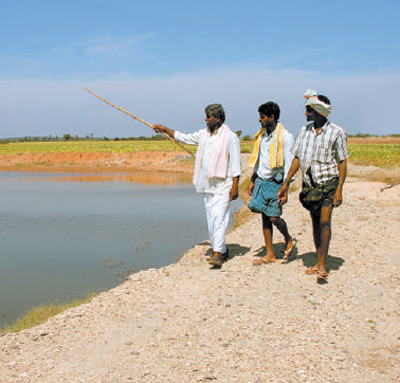Our Social Forestry programme accounted for 26% of total plantations during 2007-08, 46%
of plantations in the core area during 2007-08 and 16% of total plantations todate. The programme was extended to Guntur and Nellore districts, in addition to Khammam and Prakasam. The collaboration with the Government
of Andhra Pradesh contributed nearly 50%
of Eucalyptus plantations under this initiative.
Integrated Watershed Development Programme
In line with our commitment to create sustainable livelihoods, our watershed development programme facilitates village-based participation in building, reviving and maintaining micro-water-harvesting structures and management of water resources
to reverse land degradation, ensure soil and water conservation, provide critical irrigation and
raise agricultural productivity. Our watershed programme contributes to sustainability in the following ways - (a) Enriched soils and critical irrigation stabilises farm productivity, giving farmers assured returns and, thus, financial sustainability; (b) Efficient management of the water regime promotes sustainability of agriculture; and
(c) We are assured of procuring agri-products
in the desired quantity and of desirable quality.
The work under this initiative has spread from
5 projects in two states, to 24 projects in 7 states. Within Maharashtra we have expanded
to Ranjangaon, where ITC’s cigarette factory
is being relocated.
In partnership with NABARD, we will be undertaking soil and moisture conservation work on a total
of 17,500 hectares in Madhya Pradesh, Bihar and Andhra Pradesh.
That the farmers value the work being promoted by us is evident from the fact that to date as much as 19% of the total expenditure, amounting
to Rs 370 lakhs has been raised from them. Direct employment created on civil works till date was 5.36 lakh person days.
Sustainability too is being ensured through water user groups. Our special endeavour to nurture and strengthen the 686 active Water User Groups has led to collection of a maintenance fund of
Rs 12.67 lakhs. The bulk of this (Rs 8.76 lakhs) was collected during 2007-08. In addition to water charges as a source of revenue, efforts were also made to link the WUGs to market-based activities with a view to enhance earnings. Activities like
agri-input sales, procurement of spices and raw material for organic fertilisers resulted in a turnover
of Rs 58 lakhs for these groups during the year.
To analyse the long-term impact of our watershed programme, we collect baseline and impact data from the field to compare changes based on key indicators. The graphical representation being shared is from Rajasthan.
|
| |
Up to 2006-07 |
2007-2008 |
Todate |
| Coverage: Social Forestry |
| No. of new villages |
377 |
29 |
406 |
| No. of new beneficiaries |
10,510 |
2,982 |
13,492 |
| Plantation area (hectares) |
9,069 |
2,900 |
11,969 |
| |
Unit |
Up to 2006-07 |
2007-2008 |
To date |
| Coverage: Watershed |
|
| Area Treated |
Hectare |
12402 |
4094 |
16496 |
| Critical Irrigation |
Hectare |
14287 |
4196 |
18483 |
| Total Watershed Area |
Hectare |
26689 |
8290 |
34979 |
| Water Harvesting |
|
| Minor Structure |
No. |
1148 |
460 |
1608 |
| Major Structure |
No. |
382 |
188 |
570 |
| Total Structure |
No. |
1530 |
648 |
2178 |

|

